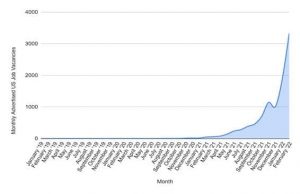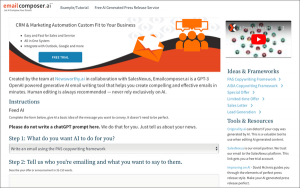
The second wave of COVID-19 has arrived, and the reality that remote work is here to stay is sinking in. This is a scary thought for many job seekers who were hoping that the economy would eventually start to recover and that things would steadily go back to normal. With businesses stunted, finding a job is still as hard as when the pandemic first hit.
With this in mind, here are six tricks for job seekers who must now overcome the odds and land a remote job while amidst this pandemic:
1. Get on remote job boards
Most people are familiar with job-hunting websites like Monster or Indeed. However, if you’re looking to maximize your chances of getting hired, there are online job boards specifically for finding remote work. These websites offer a place where remote workers and employers can connect to their mutual benefit. They will save you time and allow for a more targeted job search.
Some of the most popular remote job boards are FlexJobs and We Work Remotely. Both sites list remote jobs from reputable clients in a wide variety of fields, including web design, marketing, writing, and many more.
2. Address COVID in your resume application
As an owner of Resume Writing Services, my resume company actually conducted a very recent survey of 154 hiring managers that is designed to provide insight to job seekers on how they can optimize their job search during the pandemic. One of the key takeaways was that 63% of respondents said that it would be beneficial for applicants to address how they would adapt to COVID as an employee. This suggests that job seekers shouldn’t shy away from discussing COVID with potential employers and can likely benefit from addressing this elephant in the room on their resumes.
Perhaps an even more surprising finding was that 67% of hiring mangers also said they were more inclined to hire a job candidate who has already recovered from COVID-19. If you’re someone who’s already been exposed to COVID-19, this study is saying it’s definitely worth mentioning this fact somewhere on your application or during your job interview. The logic makes sense here as well. From what we know, if someone has been exposed to COVID-19 once, they are far less likely to get it again. As an employer, this means there are lots of advantages for hiring someone who has already recovered from the disease.
3. Build an online portfolio
One great way to stand out from the crowd is by building an online portfolio to showcase examples of your work. Employers looking to recruit remote workers often want to see evidence that applicants possess the skills they claim to have. Regardless of the sort of work you do, you will need to have finished products that can be evaluated. These can be websites, artwork, advertisements, articles, or whatever deliverables you expect to produce.
If you don’t have a considerable body of work to back up your experience, you’ll need to start producing mock projects to get the ball rolling. It may seem like more work on the front end of things, but it will dramatically improve your chances of getting hired. Anybody can claim a skill or ability. However, pre-produced examples of work constitute solid evidence of what you can actually do.
Be sure to include links to your portfolio on your resume or LinkedIn.
4. Master remote presentation tools
Working remotely is only possible when you’re equipped with the right communication tools. While email is the gold standard for online correspondence, there may be times when projects necessitate more than an email. Video conferencing and remote presenting are critical elements of the work-from-home process.
Whether an employer is requesting a video interview or a potential client would like to discuss the details of a project face-to-face, it is critically important to familiarize yourself with popular video conferencing apps such as Google Meet, Zoom, or Skype.
Don’t wait until you get an interview request to open up Google Meet. If you take the time beforehand to learn the ins and outs of the app and test your equipment, it reduces frustration for both parties and enhances your image as an online professional. Ask a friend or relative to help you practice on these applications in an effort to master them.
5. Build your personal brand
The transition to remote work opens up new opportunities to advertise yourself online. This requires careful curation of your online presence or personal brand. Your personal brand is your reputation: What makes you unique? How do you add value to potential employers?
Before employers look you up online, you will need to ensure they form the right impression of you. Take the time to let them know who you are, the kind of work you produce, as well as your skills and career objectives.
Where do you promote this personal brand? A growing number of remote workers manage professional blogs to highlight projects and accomplishments or start a website to promote their services. Social media platforms like Twitter, Instagram, and LinkedIn not only facilitate self-promotion but make it easier than ever to build relationships with possible employers or clients.
It may seem like extra work to manage a blog or a Twitter account, but the work pays off in the end. Remote work is all about cultivating relationships.
6. Tailor your resume for remote jobs
Slight changes to your resume are required to get them ready for remote job applications. After all, you’re applying for a rather different kind of work and your resume is the first opportunity to demonstrate your readiness. First, add links to a LinkedIn profile or other places online where an employer can get to know you like professional social media accounts or a website.
Remote jobs require a considerable amount of communication and collaboration over long distances. Job descriptions on resumes are excellent places to highlight group projects and ways you facilitated communication among working partners. Further, this new kind of work demands proficiency in a variety of remote tools and your resume should reflect that. It’s considerably harder to train remote employers, so be sure to detail the software, applications, and other tools you’re well-versed in to get the job done.
Finally, sending out generic resumes to each job won’t lead to many callbacks – especially in this down economy. By just spending that little bit of extra effort to tailor your resume to each job, you present yourself as a far better fit for that position.
Conclusion
Unfortunately, COVID-19 isn’t going away anytime soon. As someone looking for a job during this down economy, you need every advantage you can get. Those who are willing to adapt are the ones who are most likely to find new job opportunities and move their career in the right direction.
Business & Finance Articles on Business 2 Community
(22)
Report Post






